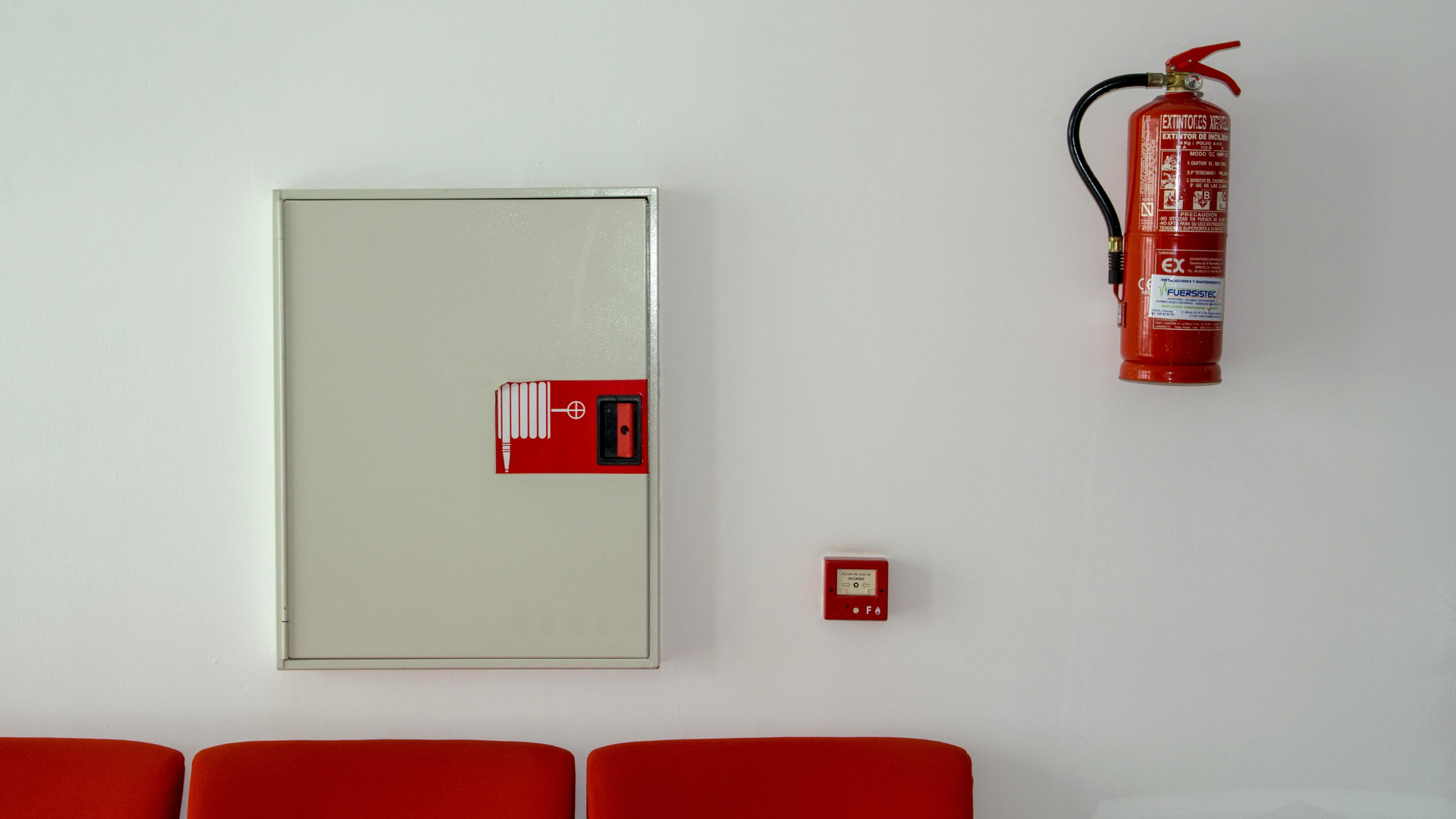In any commercial building, cleaning and fire safety go hand in hand. Dust, debris and poorly maintained areas increase the risk of ignition and make evacuation routes harder to access in an emergency.
According to the UK Fire and Rescue Service, around 22,000 non-residential fires occur each year, many linked to poor maintenance or inadequate housekeeping. Regular cleaning and waste management help prevent these hazards before they develop.
Clean offices also support compliance with fire safety regulations by keeping critical areas such as stairwells, corridors and plant rooms clear and hazard-free.
Fire safety regulations every business should know
Commercial buildings in the UK must comply with the Regulatory Reform (Fire Safety) Order 2005, which sets out responsibilities for employers, building owners and occupiers.
This includes:
-
Conducting and maintaining an up-to-date fire risk assessment
-
Ensuring escape routes are kept clear and accessible
-
Preventing the build-up of combustible waste
-
Maintaining electrical, lighting and ventilation systems in safe condition
The Fire Industry Association (FIA) and Health and Safety Executive (HSE) both emphasise the importance of good housekeeping in meeting these duties. A well-managed cleaning contract helps maintain compliance across all these areas.
Cleaning routines that reduce fire risks
Waste control and recycling
Accumulated waste is one of the most common causes of office fires. Paper, cardboard and packaging materials ignite easily and can fuel a fire’s spread.
Regular removal of waste from high-traffic zones and dedicated recycling points keeps materials under control. Cleaning teams should ensure bins are emptied daily and stored in non-combustible containers away from electrical equipment or exits.
Electrical and IT areas
Dust and static build-up on servers, cables and air vents increase the risk of overheating. Cleaning near electrical equipment requires trained staff who understand safe methods, using dry microfibre cloths and anti-static tools.
As discussed in our blog ‘How to maintain climate-controlled storage areas through cleaning‘, consistent maintenance in these sensitive spaces also supports system reliability and energy efficiency.
Kitchens and break areas
Grease and residue from food preparation can create hidden fire hazards. Cleaning should include daily wiping of surfaces, degreasing of appliances and regular checks of extractor filters to prevent build-up.
Scheduling deep cleans in kitchen areas at least once a quarter helps reduce long-term risk and improves air quality.
Maintaining clear escape routes
Escape routes must always remain free from obstructions. Cleaning teams play a key role in identifying and reporting blocked corridors or misplaced storage items that could delay evacuation.
Regular cleaning of stairwells, lifts and emergency exits not only ensures compliance but also keeps these spaces visible, safe and welcoming for daily use.
Signage, emergency lighting and fire extinguishers should remain visible and accessible at all times. If anything is damaged or out of date, cleaning operatives should report it immediately to facilities teams.
Fire-resistant materials and sustainable products
The choice of cleaning products and materials also supports fire safety. Using BS EN-approved consumables and fire-rated waste bags reduces the risk of accidental ignition. Sustainable consumables with low-VOC formulations can further improve indoor air quality and reduce chemical exposure.
At DOC Cleaning, our Beyond Cleaning strategy ensures all products are safe, sustainable and compliant with environmental and safety standards. We work with trusted partners such to source materials that meet both safety and sustainability goals.
The importance of training and awareness
Fire safety is everyone’s responsibility, and cleaning operatives are often the first to notice potential risks.
Training should cover:
-
Recognising and reporting blocked exits or damaged extinguishers
-
Safe storage and handling of flammable cleaning materials
-
Emergency procedures and assembly points
-
Correct use of electrical cleaning equipment
Providers accredited by the British Institute of Cleaning Science (BICSc) or the Safety Assessment Federation (SAFed) can help ensure operatives meet high industry standards.
Inspection, documentation and ongoing compliance
Regular inspections and documented cleaning records are essential for demonstrating compliance during audits.
| Inspection area | Frequency | Key check |
|---|---|---|
| Escape routes and exits | Daily | Clear, unobstructed, well lit |
| Waste storage | Daily | Segregated and away from heat sources |
| Electrical cupboards | Weekly | Free of dust and clutter |
| Kitchens and canteens | Weekly | Grease removal, clean filters |
| Fire doors and signage | Monthly | Fully functional, visible and labelled |
Maintaining a digital log of inspections ensures full transparency. Systems such as Facility Apps allow clients to review updates in real time, reinforcing accountability and communication.
Collaboration between cleaning and facilities teams
Effective fire safety relies on collaboration. Cleaning teams, facilities managers and building engineers should hold regular reviews to discuss risk assessment updates, maintenance schedules and incident reporting.
This partnership approach ensures that cleaning activity supports wider compliance frameworks such as ISO 45001 for occupational health and safety and ISO 14001 for environmental management.
Our blog ‘How to mobilise an office cleaning contract smoothly’ explains how this level of collaboration can be built from the very start of a contract.
Why choosing the right partner matters
A cleaning provider experienced in fire safety awareness can help reduce risk, ensure compliance and support insurance requirements. Providers with established reporting systems and accredited training frameworks offer added assurance to clients operating in multi-tenant or high-rise buildings across London and other major cities.
With over five decades of experience managing complex corporate sites, we understand the importance of integrating cleaning with wider building safety strategies.
Get in touch
If you manage or own a commercial property and want to strengthen your fire safety compliance, we can help. Our team delivers professional office cleaning designed to meet safety regulations, enhance wellbeing and reduce risk.
Contact us today to discuss how we can support your fire safety and cleaning strategy.
